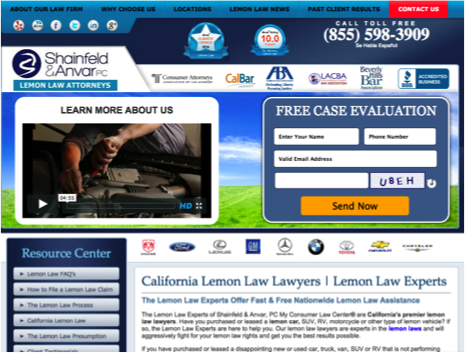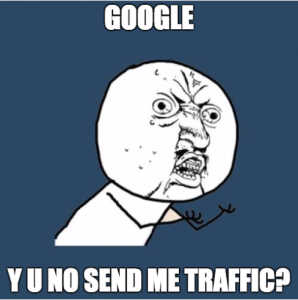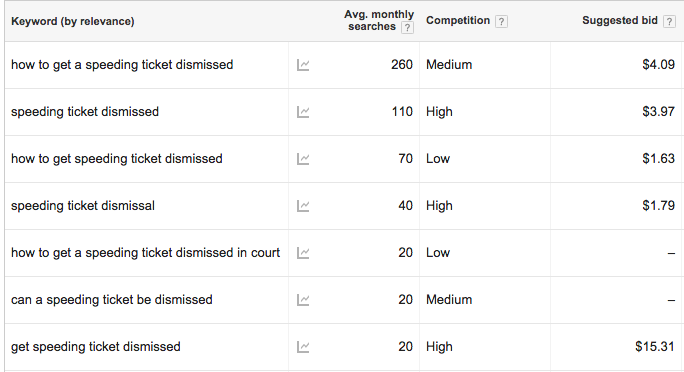
I have a confession to make. Nearly half of my success as a content marketer has been thanks to Reddit.
Reddit.com is a place where people post links to their content, or questions for the community, and have other people vote on whether it is good or not. The more upvotes that a link gets, the more people see it (and they can upvote that link in turn). The website is huge–managing to bring in around 7.5 Billion Pageviews per month. All I needed to get was the tiniest fraction of that traffic, and my job was done.
For me, successful submissions to reddit has lead to thousands of visits, hundreds of tweets, hundreds of Facebook shares, and usually a few good links thanks to the exposure the content receives. While this is no substitute for building a dedicated audience over a long period time, when done right, a successful reddit post can give you the short term boost you need to expose your content to a much larger audience than your twitter followers or Facebook friends ever could (unless you happen to be Kim Kardashian). In this post I hope to give you a quick overview of just what reddit is and how to best use it to drive traffic to your site.
Subreddits
Because user interests are as diverse as the internet itself, reddit is divided into “subreddits”. Subreddits are communities within reddit organized around a particular purpose or catering towards a specific interest group. Subreddits can be started by anyone, and moderators within the subreddit have the power to delete posts or ban users. Each subreddit has a unique URL with the domain name, an “/r/” separator and the name of the subreddit:
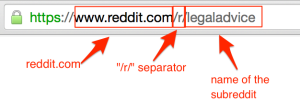
Sometimes you can find an interesting subreddit just by typing in the subject name after the “/r/” separator. For example, if you happen to be interested in all the goings on in your city, you can usually type in http://www.reddit.com/r/yourcityname and find a whole bunch of content relevant to locals who live in your area. One example of this is Seattle’s subreddit: http://www.reddit.com/r/Seattle.
Just to give you an idea of what’s out there, here are some notable subreddits:
- /r/todayilearned – A subreddit where people post interesting facts they’ve just learned. (usually with a reference to a wikipedia page or blog post).
- /r/dataisbeautiful – A subreddit showing compeling data visualizations and infographics
- /r/aww – Cute pictures of puppies, kitties, ducklings, hedgehogs, bear cubs, etc.
- /r/changemyview – A subreddit where people actively engage in polite conversation and debate about a topic, fostering open-mindedness
- /r/legaladvice – People ask for legal advice about a specific topic, and others respond with advice
- /r/breakingbad – A subreddit for fans of the AMC TV show “Breaking Bad”
- /r/monkslookingatbeer – The description is in the title
If you visit reddit as a non-user, you’ll see posts from a wide variety of subreddits, many of which cover topics that would not be interesting to any single user, that’s why reddit gives you an option to create an account and then subscribe to the subreddits you happen to be interested in. Then, when you visit reddit.com, you’ll start to see posts from the subreddits from which you happen to be subscribed. The more popular the subreddit, or the more subscribers it has, the more likely it will rank high on your personal front page.
Let’s say, for example, you post an infographic about the number of discrimination related lawsuits in each US State. The /r/dataisbeautiful subreddit is a pretty great place for this because they’re all about interesting data visualizations, also, on the right hand column of the subreddit you can see that they have 3,952,900 readers. You will also see a much smaller number that says how many people are currently on the subreddit page itself:

Your brand new infographic post to the subreddit will start out with zero votes, and will show up at the top of the “new” posts tab. If your post is really good, just a few votes will propel it to the front page of the subreddit. When it comes to ranking in reddit, vote velocity is extremely important, so if a post to /r/dataisbeautiful gets 5 votes within 10 minutes, it will likely reach the front page, and will temporarily outrank older posts with hundreds of votes. If vote velocity continues to increase in volume, your post could then be propelled to the #1 spot in that subreddit.
The #1 spot
The #1 spot is where the magic happens. Most people are only casual readers of any single subreddit, and will rarely visit that subreddit unless it that subreddit is focused on a topic of significant interest to them. Casual users of reddit will often stay on their “front page”, which happens to show only the top one or two posts from each subreddit they happen to be subscribed to. This means that you probably won’t reach most of your potential audience unless your post is fortunate to reach the #1 spot.
Depending on the subreddit, reaching the #1 spot can be either very difficult or very easy, and it usually has to do with the number of subscribers. Generally, the more subscribers there are for any single subreddit, the more posts you have to compete against. If you want to create content with the aim of reaching the top spot of a particular subreddit, your best bet would be to research what kind of content is popular with that subreddit, and then see if you can create something that reaches the same level of quality.
If you’re really lucky, you’ll be able to reach the top spot for one of the 50 default subreddits that happen to show for users who aren’t logged it. If one of those posts get enough votes, you have a chance of getting to the #1 spot for all of reddit, which can send an untold amount of traffic your way, so much so, that your servers better be equipped to handle it all.
Researching Subreddits
One of the first places I go to when researching subreddits is reddit search. For example, If I’m an employment lawyer and want to create some content about LGBT workplace discrimination, I can go to reddit search and type in “fired for being gay” and see what I get.
If you follow the link provided above, you’ll notice that the first section is a short list of the three most relevant subreddits:
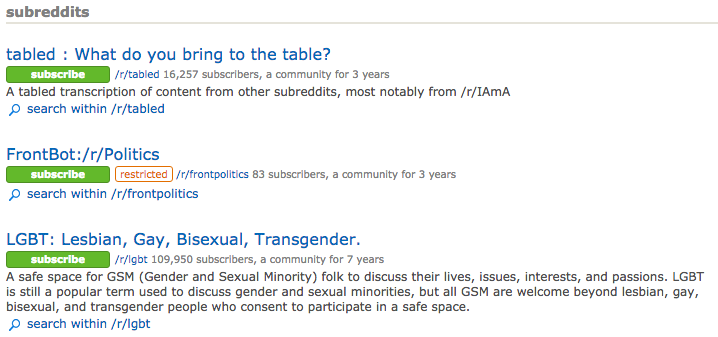
Not surprisingly, the subreddits /r/politics and /r/lgbt are among the most popular subreddits for this search query. Below those subreddits you will then see the most relevant posts. This gives you an idea of the variety of content out there on reddit relevant to the search term “fired for being gay”:
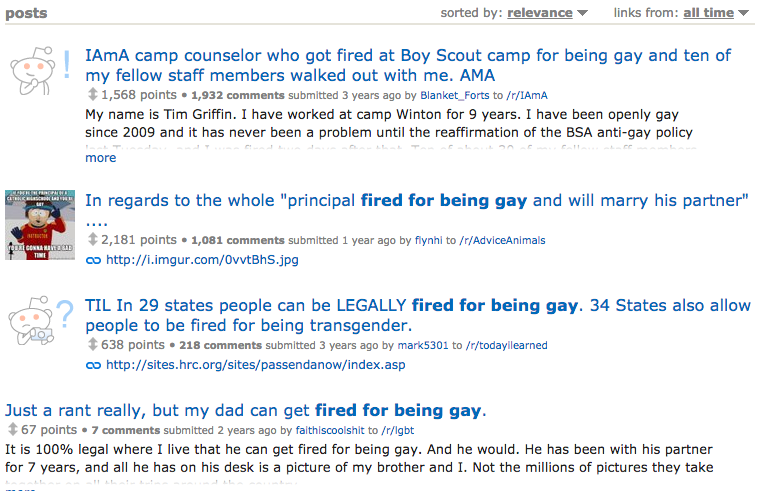
If you scroll down to the bottom of the page, however, you will see a longer list of subreddits with the number of relevant posts next to it. This will often show you subreddits that you may have not thought about.

Just by looking at this list, one subreddit that stands out to me is /r/TalesFromRetail which may be appropriate place to post many different kinds of Employee law and employee discrimination related content, especially since the subreddit has over 220,000 subscribers.
Qualifying Subreddits
Not all subreddits are created equal. While you can post a link to more than one subreddit, relentless posting of the same link to several subreddits can be an indicator that you are a spammer. Ideally, you should only post to the most qualified subreddits for your content.
When qualifying subreddits, there are three factors that I look at:
Number of subscribers: Generally, I don’t post a link to a subreddit with less than 1,000 subscribers, and ideally my goal is to get to the front page of a subreddit with at least 10,000 subscribers. Also, unless I feel my content is really top tier, I generally don’t submit it to the most popular subreddits as it will often get drowned in a sheer volume of posts.
Subreddit Rules: Before posting a link to any subreddit, be sure that you read and understand all of the rules of the subreddit. For example, /r/TalesFromRetail requires that you only post stories about your own experiences. If I was an attorney wrote a blog post about a client being discriminated against at work, I would not be able to post that content. It looks like there is nothing against that client posting that blog post themselves. So while the rules don’t exclude the possibility of using that subreddit for promotion, I’d probably look elsewhere to promote my post.
Subreddit Culture: Each subreddit has its own culture, so it’s important to get a feel for the kind of posts that would be appropriate for it. If the subreddit likes in-depth thought pieces, then you should post an in-depth thought piece, if the subreddit likes fascinating data visualizations then you should post a fascinating data visualization. If you’re aiming for the #1 spot in a subreddit, it’s important to fit the mold of the subreddit you happen to be posting for.
Creating Content for Reddit
Although this can sometimes narrow your options when it comes to what other subreddits you can post to, sometimes it can be very helpful to tailor your content for a specific subreddit. Lawyers need to be especially creative. I did a search for law related subreddits and found the three largest ones, /r/legaladvice, /r/legal, and /r/law to be less than promising. Just a quick qualifying of those subreddits and I learn that /r/legaladvice is only a place for people to ask legal questions, r/legal doesn’t have many subscribers, and /r/law specifically prohibits attorneys from posting links to their own website in their subreddit rules.
Create content that matches your interests and hobbies
Just because you’re a lawyer doesn’t mean you need to write a blog post about the law. Perhaps you are an employment lawyer and you are also a fanatic of the AMC show madmen. One content idea could be to tally the workplace violations in every episode that could be grounds for a harassment lawsuit. This way you could reach the 42,000 subscriber audience of /r/Madmen who could then further amplify your content through Facebook and Twitter. Also, since this content could also make one heck of an infograph, you could probably also submit it to /r/DataIsBeautiful as well.
Create content that leverages your expertise
As attorneys, there are countless opportunities to provide a professional opinion about a certain case that is making headlines. Any post that can provide an interesting legal perspective about events in the news could have a lot of potential.
Create local content for your city’s subreddit
If you happen to live in a large enough city, chances are your city’s subreddit (like /r/Seattle or /r/Houston) could have a reasonable number of subscribers. You don’t need to write about national news to be successful on reddit. A blog post about something going on in your home town could be a perfect match for your city’s subreddit.
Some Things to be Aware Of When Posting
Once you’ve created your content and qualified that the content is appropriate for the subreddits you want to post to, it’s important to be aware of some of the potential pitfalls you might encounter when posting.
Avoid content that is overly self-promotional
Redditors are a savvy bunch, and can smell self-promotion or a sales pitch a mile away. A common theme with most legal blog posts is to append each post with cookie cutter text that says something to the effect of “If you or a loved one has encountered a similar situation as the one outlined in the story above, please call Smith & Smith at 555-555-5555 today!” Remember that the blog post is on a legal firm website, and if anyone needs your services it should be displayed clearly in the top right corner of your website header. No need to hit the reader over the head with it.
Be careful of SPAM filters
Occasionally, something I post will get caught up in an automated SPAM filter. These filters most often get triggered when you’ve posted to a subreddit you haven’t participated in before. Thus, it’s considered a best practice to upvote, downvote, and comment on other posts in a particultar subreddit before posting yourself. I must confess, however, that as a time constrained content marketer I didn’t always have that luxury. This is why I would be sure to click the “new” tab in the subreddit after posting. If your post doesn’t show up in the “new” posts section just after you’ve posted, it most likely has been caught in a SPAM filter. Best practice is to message the moderator of that subreddit to approve your post.
Sometimes it can be helpful to mention that you’ve created the content
Redditors can sometimes be ruthless when it comes to downvoting content that they believe doesn’t live up to their standards. While this is only an anecdotal observation, I have noticed that when I preface my reddit posts with “A blog post I wrote about…” it seems that the response is a lot friendlier than if I anonymously dumped my content on the subreddit. Mentioning you’ve created the content shows there’s a living breathing human behind the post, and the reception will be all the better because of it.
Rules!
While I mentioned this above this is worth mentioning twice. If your post doesn’t conform to the rules of a subreddit, it can get deleted by moderators. Sometimes you may even get nasty comments from mods or even get banned. Be sure to review the rules and if your post does not fit, it’s best to post elsewhere.
After Posting: Monitor Reddit Comments and Inbound Traffic
While usually it’s good enough to post a link. It can also be helpful to monitor the conversation that emerges in the comments of your post. I must confess that I don’t participate in much in the conversations of my posts, but oftentimes I am alerted to something I may have gotten wrong in my original post (which I then swiftly correct). You can also help keep the conversation going by responding to particularly interesting comments.
It can also be helpful to keep an eye on the real time traffic that comes through to your site. You can do this by following the real time traffic that comes to your site through Google Analytics. Once you’re there, you can see just how many people are currently visiting your site, and from where:
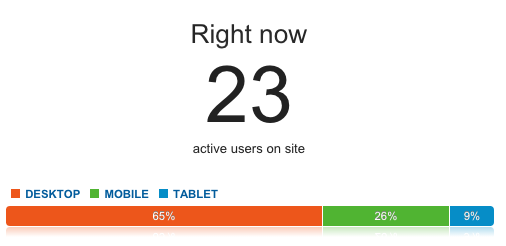
Watching how many people visit your site can be both addictively exciting and useful. It can be useful because you can see what happens to your content after you post to reddit. If, for example, someone posts to a forum and that forum happens to be sending a good number of visitors your way, it may be good to join the conversation there. Similarly if there are a lot of visits from Twitter, it may be helpful to see what is happening there as well.
